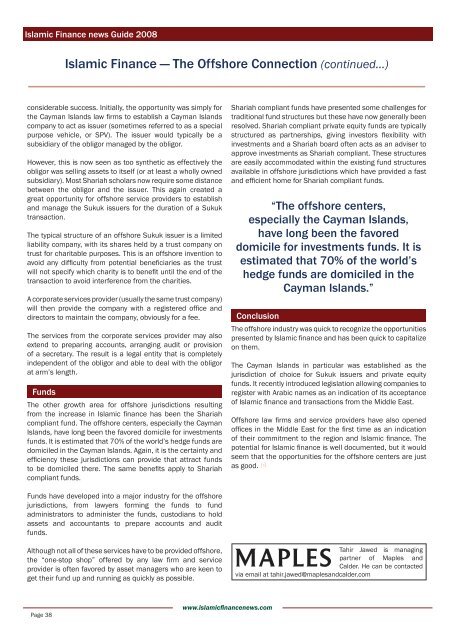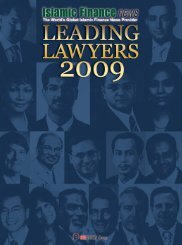You also want an ePaper? Increase the reach of your titles
YUMPU automatically turns print PDFs into web optimized ePapers that Google loves.
<strong>Islamic</strong> <strong>Finance</strong> news Guide 2008<br />
Page 38<br />
<strong>Islamic</strong> <strong>Finance</strong> — The Offshore Connection (<strong>continued</strong>...)<br />
considerable success. Initially, the opportunity was simply for<br />
the Cayman Islands law fi rms to establish a Cayman Islands<br />
company to act as issuer (sometimes referred to as a special<br />
purpose vehicle, or SPV). The issuer would typically be a<br />
subsidiary of the obligor managed by the obligor.<br />
However, this is now seen as too synthetic as effectively the<br />
obligor was selling assets to itself (or at least a wholly owned<br />
subsidiary). Most Shariah scholars now require some distance<br />
between the obligor and the issuer. This again created a<br />
great opportunity for offshore service providers to establish<br />
and manage the Sukuk issuers for the duration of a Sukuk<br />
transaction.<br />
The typical structure of an offshore Sukuk issuer is a limited<br />
liability company, with its shares held by a trust company on<br />
trust for charitable purposes. This is an offshore invention to<br />
avoid any diffi culty from potential benefi ciaries as the trust<br />
will not specify which charity is to benefi t until the end of the<br />
transaction to avoid interference from the charities.<br />
A corporate services provider (usually the same trust company)<br />
will then provide the company with a registered offi ce and<br />
directors to maintain the company, obviously for a fee.<br />
The services from the corporate services provider may also<br />
extend to preparing accounts, arranging audit or provision<br />
of a secretary. The result is a legal entity that is completely<br />
independent of the obligor and able to deal with the obligor<br />
at arm’s length.<br />
Funds<br />
The other growth area for offshore jurisdictions resulting<br />
from the increase in <strong>Islamic</strong> fi nance has been the Shariah<br />
compliant fund. The offshore centers, especially the Cayman<br />
Islands, have long been the favored domicile for investments<br />
funds. It is estimated that 70% of the world’s hedge funds are<br />
domiciled in the Cayman Islands. Again, it is the certainty and<br />
effi ciency these jurisdictions can provide that attract funds<br />
to be domiciled there. The same benefi ts apply to Shariah<br />
compliant funds.<br />
Funds have developed into a major industry for the offshore<br />
jurisdictions, from lawyers forming the funds to fund<br />
administrators to administer the funds, custodians to hold<br />
assets and accountants to prepare accounts and audit<br />
funds.<br />
Although not all of these services have to be provided offshore,<br />
the “one-stop shop” offered by any law fi rm and service<br />
provider is often favored by asset managers who are keen to<br />
get their fund up and running as quickly as possible.<br />
www.islamicfi nancenews.com<br />
Shariah compliant funds have presented some challenges for<br />
traditional fund structures but these have now generally been<br />
resolved. Shariah compliant private equity funds are typically<br />
structured as partnerships, giving investors fl exibility with<br />
investments and a Shariah board often acts as an adviser to<br />
approve investments as Shariah compliant. These structures<br />
are easily accommodated within the existing fund structures<br />
available in offshore jurisdictions which have provided a fast<br />
and effi cient home for Shariah compliant funds.<br />
“The offshore centers,<br />
especially the Cayman Islands,<br />
have long been the favored<br />
domicile for investments funds. It is<br />
estimated that 70% of the world’s<br />
hedge funds are domiciled in the<br />
Cayman Islands.”<br />
Conclusion<br />
The offshore industry was quick to recognize the opportunities<br />
presented by <strong>Islamic</strong> fi nance and has been quick to capitalize<br />
on them.<br />
The Cayman Islands in particular was established as the<br />
jurisdiction of choice for Sukuk issuers and private equity<br />
funds. It recently introduced legislation allowing companies to<br />
register with Arabic names as an indication of its acceptance<br />
of <strong>Islamic</strong> fi nance and transactions from the Middle East.<br />
Offshore law fi rms and service providers have also opened<br />
offi ces in the Middle East for the fi rst time as an indication<br />
of their commitment to the region and <strong>Islamic</strong> fi nance. The<br />
potential for <strong>Islamic</strong> fi nance is well documented, but it would<br />
seem that the opportunities for the offshore centers are just<br />
as good.<br />
Tahir Jawed is managing<br />
partner of Maples and<br />
Calder. He can be contacted<br />
via email at tahir.jawed@maplesandcalder.com

















